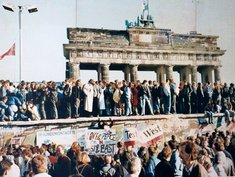|
Question or Term
|
Answer
|
|
That of the GDR with collapsed in the Summer of 1990 against newly affordable western goods (due to the 1:1 exchange rate), with farmers unable to compete with the FRG and EEC and unemployment reaching 20%, making speedy reunification necessary
|
Economy
|
|
Willy Brandt's 'Eastern Policy' in which relation with the GDR and Eastern Bloc were normalised in an implicit effort to encourage cultural and commercial exchange between the two Germany's, undermining the communist regime in the long run
|
Ostpolitik
|
|
That the key points of which were to achieve peaceful and sustained reunification by; providing humanitarian assistance, continuing cooperation with the GDR (and expanding it subject to democratisation and liberalisation), forming a confederation with the aim of federation, unifying Germany within the framework of East-West relations, integrating the GDR into the common market, and accelerating European disarmament
|
Kohl's Ten Point Plan
|
|
That country the foreign debt of which increased from 2.2bn DM in 1970 to 34.7bn DM in 1987
|
German Democratic Republic
|
|
He who began allowing free travel from the GDR from 1986 as he was under popular and party pressure to do so, believing it would stifle calls for emigration and permanent settlement in the FRG (the opposite of which occurred) and improve relations with its FRG creditor
|
Erich Honecker
|
|
The countries of Eastern and Central Europe under Soviet domination from 1945 to 1989/91 to which Gorbachev made clear in 1988 the USSR would not intervene in the internal affairs of, leading to calls for greater freedoms particularly in Poland and Czechoslovakia
|
Eastern Bloc
|
|
The year in which political parties and free trade unions were revived in both East and West Germany
|
1945
|
|
A summer 1945 conference in which the UK, USA, and USSR agreed on the division and administration of Germany and Austria
|
Potsdam Conference
|
|
An organisation composed of the US, Soviet, British, French, and Chinese Foreign Ministers, formed in 1945 to draw up peace treaties and settlements with the former Axis, reaching deadlock over Germany by 1947 causing the Western Allies to call on the Länder to draw up a new German constitution in 1948
|
Council of Foreign Ministers
|
|
That 1970 treaty between the FRG and USSR in which both powers renounced the use of force and recognised the post-Second World War borders
|
Moscow Treaty
|
|
|
Question or Term
|
Answer
|
|
The charismatic 'right-wing' SPD mayor of West Berlin who helped revitalise the party and unite it around the Godesberg Program in 1959, though not becoming leader until 1964
|
Willy Brandt
|
|
That which many were opposed to both domestically and internationally by early 1989 as it threatened the careful balance of power built up since 1945 and particularly since the 1970's détente
|
German Reunification
|
|
That individual whose unrelenting hard-line attitude - unsuccessfully calling on direct Soviet military intervention - accelerated the collapse of the GDR
|
Erich Honecker
|
|
A piecemeal, muddled, and often ideologically driven process to eradicate Nazism, ended by the Americans in 1951 as being impractical to remove so many people of expertise vital for rebuilding the country
|
Denazification
|
|
A heavily guarded dividing wall built around West Berlin in 1961 that was opened on 9th November 1989, being attacked by celebratory crowds and finally officially demolished between June 1990 and November 1991
|
Berlin Wall
|
|
Leader of the GDR from October to December 1989 who (though continuing anti-Western propaganda) tried to appease protesters (1m in East Berlin on 4th November alone) by reorganising the leadership and easing travel restrictions, only encouraging protesters further
|
Egon Krenz
|
|
Those, many of whom agreed to cooperate with Adenauer in promoting FRG democracy out of their shared fear of communism
|
Nazis
|
|
A neo-Nazi party banned in 1952, a month before the FRG agreed to pay 3 billion marks compensation to Israel for the Holocaust
|
Socialist Reich Party
|
|
That following the Second World War which principally took the form of forced labour and dismantled and exported industry as opposed to money or gold
|
Reparations
|
|
That country the principal problems in which by 1989 were that it had a low standing of living compared to the FRG (though the highest in the East), economic inequality particularly between the general public and government and Stasi members, and economic problems causing low investment and falling real wages
|
German Democratic Republic
|
|

